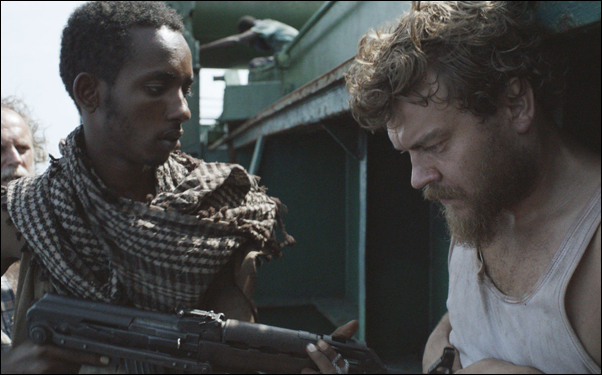When Tobias Lindholm went looking for guns to outfit the Somali pirates who take over a Danish shipping vessel in his latest film “A Hijacking,” the opportunity arose to use the real Chinese-built guns that were recovered by the Kenyan police during a real hostage crisis on the high seas when prop guns weren’t available. Already having a freighter that such a situation occurred on in the Indian Ocean for a set and a real hostage negotiator in his cast operating as if the plot were unfolding in real time, Lindholm didn’t think twice.
“If you just talk about salt, your food is not going to taste good,” says Lindholm, a warm, energetic fellow whose perfectionism wouldn’t seem to translate into megalomania. “You need to put it in there. For any element of reality that we’ve put in the film, it turned out better.”
All that authenticity would mean nothing if Lindholm’s second feature was dramatically inert as a result of such slavish devotion to detail, but to call “A Hijacking” a nailbiter doesn’t do it justice since you wouldn’t be blamed for gnawing right through your finger. Unfolding as a months-long standoff across two continents, the thriller pits a CEO charged with getting the most financially responsible result for his company against a ragtag group of pirates who have commandeered one of their ships with the crew’s cook Mikel placed in the middle with his ability to speak English to both parties.
Lindholm’s visual precision as a storyteller is such that almost no language would be required to understand what’s going on. Yet the film is as layered as it is urgent, eking out suspense from the most mundane minutiae a la Paul Greengrass, whose own “Captain Phillips” out later this year now faces the likely distinction of being “that other Somali pirate movie,” while slyly illustrating the havoc wrought by globalization where there’s frighteningly little difference in the sophistication and profit motive between large corporations and petty thieves. During a recent visit to Los Angeles, Lindholm, who will continue to wow American audiences next month with a co-writing credit on fellow Dane Thomas Vinterberg’s “The Hunt,” talked about how he carved out his own path as a filmmaker, why he considers his lack of imagination a good thing and why Somali tribal leaders wanted him to be as merciless as possible when it came to depicting their pirate population.
How did you get interested in this subject?
Denmark is a small country of five million people and it’s like 50 islands, so it’s a country of sailors. The Danish economy is built on a huge commercial fleet, so every family has a sailor there – a father, an uncle or a cousin. My father was a sailor. Then in 2007 when the first Danish ship was hijacked in the Indian Ocean, I suddenly discovered this world that I didn’t know existed. And I felt it as a very local story actually. How would the families in Denmark react to this? But it’s one of those stories that impossible to tell in the news because if you bring a journalist on a ship like that, that situation will be controlled by the pirates, so the only way we could nearly tell something that could be a truth about this story would be to make a fictional feature that could go in the situation as close to reality as possible.
You actually brought aboard a hostage negotiator who didn’t use your script. Was that key to finding the reality?
I would never write a line for him. He would just react to [what others were saying], so I had written the questions that the characters should ask him, but his response to them was just his own because he knows about this even more than I do. That meant every once in a while the answers would sound a little strange, but that would help the rest of the actors to seem surprised, seem eager to know a little more. Of course, just having a guy that had been in this situation, who could dictate how the room of negotiations would work made it authentic and real and the actors were very disciplined because they were sitting there with the real guy, so they didn’t want to make a mistake. It puts a lot of responsibility on their shoulders because they are of course controlling where the scene is going, but when you have actors that you trust and they’re good enough and they’re capable of this, it will definitely build out the situation in a more exciting way than I could ever write it because I’m just one person imagining something.
This must’ve been shot in two parts – once you get done with one section, does that affect how you work on the second?
We actually shot the part on the boat in Africa first, so we would go back to Denmark and start all over again and we shot it in chronological order so the actors wouldn’t need to imagine what it would be like to be there in the end. They were actually there on the final day when we shot the final day. One of the reasons for that was Pilou [Asbæk, who plays Mikkel the boat’s cook] gained 20 kilos for the part and he wanted to lose all of them, so he stopped eating as soon as we got on the boat. He just had like 100 grams of chicken a day and that’s it, so he would lose 18.5 kilos during the shooting – that dictated that we needed to do it in the right order. But we had five days between finishing up and actually starting in Denmark and that would give me some time to review the situation knowing what didn’t work out on the boat and what can we do in Denmark to compensate for that. [The two shoots] definitely affected each other, but the actors never read each other’s script, so Pilou only read what happened on the boat and Søren would only read what happened in the office space and that meant they never were smarter than their characters. They didn’t know what was going on, so they couldn’t add any cleverness to the part. They just needed to react in the situations.
How did you cast the Somali pirates?
We would cast these guys from the streets of Mombasa and from the Somali community there and they’re not real pirates, but they had the looks. We could definitely see it work, but I needed to get the approval from the clan leaders in the Somali community, so we went out there for a meeting and I had prepared this rather romantic version of the story to pitch and they just right away said, “Tell the truth. We’re losing our young guys to this. They think they’re going to be millionaires, they think this is the way to happiness and they don’t know the truth of it, so please make a movie that will tell the truth of it so we can show it to them.” That surprised us a lot and they, of course, permitted us to cast the young men.
This is such an interesting way to shine a light on wealth disparity, not only between rich and poor nations, but between the sailors caught in the middle with families to support and the corporate class who operate on a different value system. Did what’s going on in the larger world touch the script?
It touched it because it is part of the reality of this guy Peter [the CEO], so in researching his world and writing his character and his journey throughout the film, it’s impossible not to comment on it. But I do believe that the only way to make a truthful and sophisticated point in these matters is to not point at it directly, but to let it reflect in the material that you are working on. In our case, the easiest part would be to just tell a story about a very greedy company leader that wouldn’t want to pay [the pirates’ demands]. But that wasn’t reflected in the research. We saw a guy who was actually very responsible, but he was caught in a very strange game, which means it’s a Danish-owned ship but it sails under the Panama flag, which means Denmark is not allowed to get involved at all. And you have seven different nationalities on both ships, so who’s going to react to it? No one really wants to take that responsibility, so it ends up on the table of a businessman who’s used to making money off of sailing wood and coffee around the world. It’s not his job to negotiate life and death, but he’s caught in that situation all of sudden. That is the price he’s paying for how the world turned out and that’s the price he’s paying for what generations ago Danish sailors did in Northern Africa. So everything is connected, but I didn’t want to do a very clever script on how the butterfly wings will create a storm.
One of the most creepy aspects of the film is how cordial the conversations are between the pirates and the management. Most start with “hello, how are you?” Was that striking to you in the research?
I totally agree. And I read a lot of transcripts of negotiations between CEOs and pirates and that’s what surprised me the most was the tone of these conversations. They are talking to each other as businessmen as if they were negotiating a lower house price. Quite fast, it will turn into everyday life, that negotiation and it’s not very tense. Once in a while, you can actually relax and just look at it as a negotiation, which surprised me a lot, but in the end when this has been going on for a long time, there’s no more “Hello, how are you doing?” They’re on the point. But it’s not until we’re getting closer to the climax. Until then, it’s just two businessmen talking and that surprised me a lot. It is very creepy. At the same time, it gives a lot of character and a lot of humanity to the pirates as well and that I definitely needed.
You’ve now co-written two films with Thomas Vinterberg, which is interesting because while he’s been moving in a more classical direction as a director with your two collaborations, your films as a director seem to be cut from a similar cloth as his earlier work such as “The Celebration.” Has he been a big influence?
Totally. And actually before we started to work together, he was one of my big heroes in Danish film. The first two Dogme films, “The Idiots” and “The Celebration,” made me want to make films. At that point, I thought I should write novels and watching those made me realize that film could be as much alive as literature in many ways. Even if I wasn’t working with him now, he would be a great influence on the way I do stuff and my whole little rock band there [in Denmark], we are proudly on the shoulders of the Dogme movement. We add violence and weapons and stuff, so we’re breaking every rule of the whole Dogme movement, but we’re also on the shoulders of guys like Cassavetes from over here and for me, there’s a connection between Dogme and ’70s Hollywood, too.
But Thomas means a lot. We wrote “Submarino” just after I got out of film school, did “The Hunt” just after that, and we’re writing his next one now. When I did my first feature “R,” he did “Submarino” at the same time, we would write it and then we’d start shooting it the same day. We did exactly the same on “A Hijacking” and “The Hunt.” We would start like within two, three days the production. And actually next August it seems, we both will start our next films, so right now, we’re just walking the path together.
If you were thinking of being a novelist, how did you get interested in making films, aside from the seeing Dogme movies?
It’s a big coincidence. I’m from a part of Denmark where making movies is not a possibility. I started to read a lot around the age of 20 and when I was 25, I just did a lot of graffiti and skating and watched sports and drank beer with my friends in Denmark. I felt like, oh, soon I need to do something. I can’t just get stuck here. I had just read John Fante’s Bandini Trilogy and reading that, I thought if I write 10 pages a day, then in 40 days, I’ll have 400 pages and that’s a novel. And it worked out actually! I ended up with 400 pages of material and I showed it to a neighbor I had who was a screenwriter. She had a lot of kids at the time, so I would go buy groceries for her and help her out, and she read it and she was like, “I really like it, but why the fuck are you not writing films?” I said, I never thought of that possibility. She connected me with a director that was graduating from Danish film school and needed a writer to help him with that project, so I would go and write that and I never looked back. I fell in love with the language of films.
Both your first film, the prison drama “R,” and “A Hijacking” prize realism. Where did that interest come from?
I just never found me that interesting. I found the world around me very interesting and there’s a conflict in this because I’m a writer and I don’t like imagination. I think imagination makes foolish stuff, or at least if you don’t make the rules of the world you’re entering, then anything can happen and I don’t enjoy that. There’s a lot of films [like that] that I love, but I don’t enjoy writing it. It basically comes down to when I’m in my small office at nighttime writing when my kids are asleep what can keep me awake and that is to dig down into reality and try to make scenes communicate a plot without admitting to communicate a plot. That is a difficult thing, but that is the thing that is in documentaries. You see guys there and they’ll just go out and then they’ll find the story during the process. We cannot do this in fiction. We need to have a screenplay, or at least I do, but I can figure out the screenplay in the same way by creating the structure of the story and then fill in all the blanks with research and let the world around me dictate how this drama could unfold. That helps me to keep sharp and be in love with the world instead of just sitting there being God and I can kill anybody that I want to on my computer. It’s the only thing that makes sense for me.
“A Hijacking” is now open in Los Angeles at the Royal Theatre and the Pasadena Playhouse 7, in San Francisco at the Embarcadero Center and the Smith Rafael Film Center in San Rafael, and in New York at the Lincoln Plaza Cinemas and Film Forum. It will expand into limited release on June 28th. A full list of theaters can be found here.




